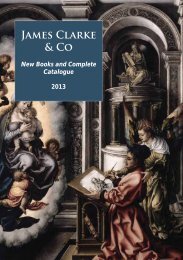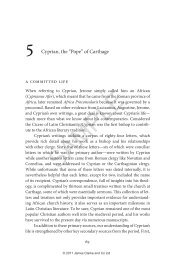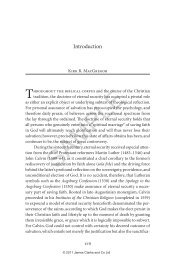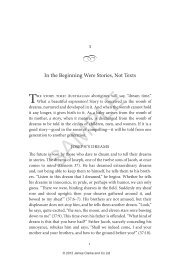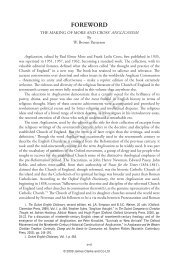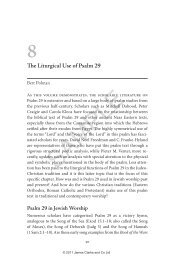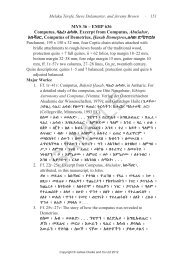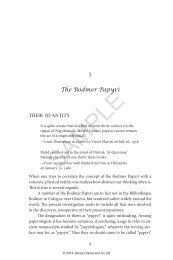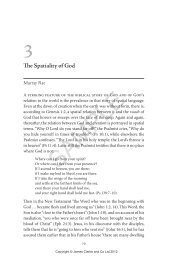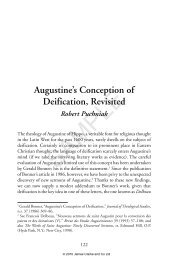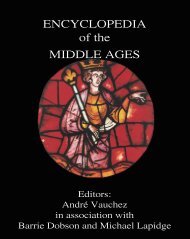Extract from Chapter 1 - James Clarke and Co Ltd
Extract from Chapter 1 - James Clarke and Co Ltd
Extract from Chapter 1 - James Clarke and Co Ltd
Create successful ePaper yourself
Turn your PDF publications into a flip-book with our unique Google optimized e-Paper software.
The Textual Words of the Analects <strong>and</strong> the Letter to the Galatians<br />
63<br />
tion to the root which, in the case of ren (human heartedness), are<br />
filial piety <strong>and</strong> fraternal submission. . . . <strong>Chapter</strong> III supplements<br />
II, providing an indication of where not to look for ren. Ren, it<br />
announces, is seldom associated with fine words <strong>and</strong> insinuating<br />
appearance. This is typical of the Lunyu: no definition, but a series<br />
of pointers. . . . Ideas are introduced but the definition of them is<br />
left up to the reader. 20<br />
Thus, the text of the Analects preserves the dynamic definitions of<br />
<strong>Co</strong>nfucius opening up the possibility for the reader to reconceptualize<br />
how to be fully human in a multitude of diverse situations.<br />
<strong>Co</strong>nsistent with the Master’s pedagogy, the editors of the Analects<br />
seek to draw forth the reader’s participation as he engages the text. Jay G.<br />
Williams suggests that 1:1 sets the tone for the whole book:<br />
<strong>Chapter</strong> I is not meant to be read like an Aristotelian treatise, as<br />
a series of arguments terminating in a conclusion. Its rhetoric is<br />
that of the intellectual puzzle which calls upon the reader to supply,<br />
through imaginative insight, the missing links. The reader is<br />
invited, not to follow the argument, but to construct it. 21<br />
The life disciplined in study is an enjoyment derived <strong>from</strong> a journey of<br />
discovery, rediscovery, imagination, <strong>and</strong> internalization. This path of discovery<br />
is made possible through yan (word or rhetoric).<br />
Another significant word in the Analects interrelated with yan is<br />
wen, which can mean “knowledge,” “learning” (Analects 1:6), “culture”<br />
(3:14, 9:5), “fond of learning” (5:15), “embellishment” (6:18, 19:8), “classics”<br />
(7:25), “knowledge” (9:11), “knowledge of classics” (9:27), or “refinement”<br />
(8:24), as seen in Lau’s translation. Wen often means “pattern”<br />
as well (1:6). Analects 5:13 talks about the wenzhang of <strong>Co</strong>nfucius. What<br />
is the wenzhang of <strong>Co</strong>nfucius? The history of interpretation gives different<br />
meanings:<br />
SAMPLE<br />
It could refer to <strong>Co</strong>nfucius’ personal displays of culture. In<br />
Analects 5:15, Zigong asks why an official named Kong was given<br />
the posthumous name the cultured one (wenzi). But equally plausible<br />
is the idea that wen refers to the cultural forms of the Zhou<br />
dynasty. One finds support for this reading in Analects 9:5, where<br />
20. Williams, “On Reading A <strong>Co</strong>nfucian Classic,” 109–10; Slingerl<strong>and</strong>, trans.,<br />
<strong>Co</strong>nfucius Analects, 1–16.<br />
21. Williams, “On Reading A <strong>Co</strong>nfucian Classic,” 108–9.<br />
© 2008 <strong>James</strong> <strong>Clarke</strong> <strong>and</strong> <strong>Co</strong> <strong>Ltd</strong>



